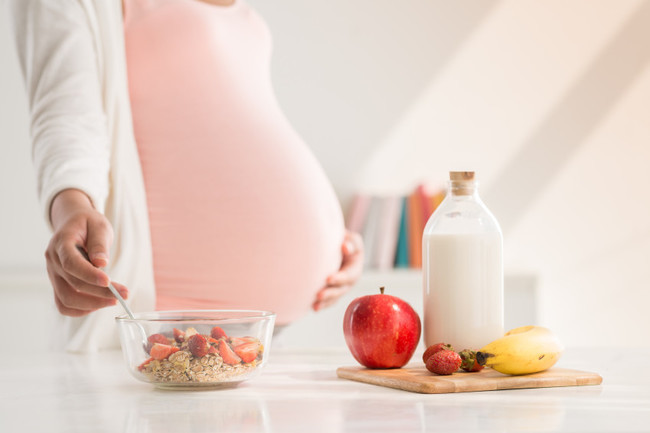The woman who plans to become pregnant has to begin controlling her diet before the pregnancy to achieve healthy development of the foetus. Diet is important for improving fertility and embryo development.
From a hygienic point of view, you must wash your hands, and clean kitchen surfaces and utensils. Fruit, vegetables and herbs such as parsley or basil must be washed. It is even recommended to immerse them in products apt for vegetable disinfection.
Keep cooked food leftovers in closed containers in the fridge at 4º C or lower (39º F or lower) and try to consume them as soon as possible.
As to lean meats, you can eat any variety like skinless chicken, turkey or pork (fat should be trimmed) but you must cook the meat completely up to 71º C or 160º F. The colour of the meat must change. This is crucial to avoid being infected with toxoplasmosis, listeriosis or similar diseases.
Raw fish can contain anisakis which can cause digestive problems and severe allergic reactions. The advice is to freeze raw fish for 24 hours or cook it well in an oven, frier or grill it to avoid health issues. When the fish’s interior temperature reaches 60º C or 140º F and is kept for one minute, the pathogens are neutralised, and you can observe that the meat turns opaque and comes off the fishbone easily. The advised consumption is 3-4 portions per week, especially blue and white fish. Avoid fish with high levels of mercury like Atlantic bluefin tuna, shark, etc.
You should eat dairy products like yoghurt or cheese 2 or 3 times a day. The products should be pasteurised or sterilised (UHT). Do not consume dairy products made of raw milk, and in the case of cheese, store it in the fridge even if it is aged cheese. Always remove the peel.
This is how you should plan correct daily nutrition: half of the consumed food should be of plant origin, one quarter – rich in proteins such as legumes, eggs, fish and lean meats, and another quarter – cereal (preferably integral), potatoes and other tubers.
Nuts are rich in healthy fats, proteins and minerals. You can eat a little handful of them during any meal or as a snack. You should eat 3 fruits a day, preferably of the season.
Good hydration is important, so you should drink about 2 litres of water a day and reduce a lot your intake of salt and sugars.
During the first trimester of pregnancy, you may face digestive issues like nausea and vomiting which you can mitigate by adapting your diet. You can eat more frequently but smaller portions of solid foods because they are better tolerated. Lessen the intake of liquid and fat foods.
You can control constipation by consuming more products rich in fibre (e.g., legumes, fruits, vegetables, nuts, etc.), drinking plenty of water and avoiding a sedentary lifestyle.
Heartburn or acid reflux is quite common during pregnancy, so you should go to sleep at least one hour later after eating. Avoid fatty and spicy meals, sodas and caffeine.
Gregorio Manzanera
IMAGE: https://www.bebesymas.com/nutricion-embarazo/24-alimentos-recomendados-durante-embarazo-nutricionistas-ginecologos

